One-Eyed Jacks
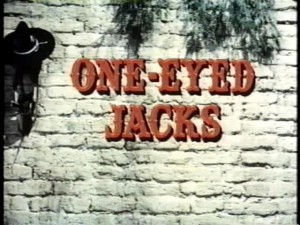 Here’s the idea behind “A Canadian, an American, and an Elitist”: Rhett’s favorite movie is Meatballs 4, Shawn has an unhealthy fixation on Resident Evil, and Adam is a prick who hates everything. We all watch far too many movies, and spend our time analyzing them. So we each watch the same movie, write our analysis of them, and then go to a chat room to discuss it, unaware of what the others have written. A warning: if you haven’t seen the film we are discussing, it may not be best to read this article, because it is spoiler heavy.
Here’s the idea behind “A Canadian, an American, and an Elitist”: Rhett’s favorite movie is Meatballs 4, Shawn has an unhealthy fixation on Resident Evil, and Adam is a prick who hates everything. We all watch far too many movies, and spend our time analyzing them. So we each watch the same movie, write our analysis of them, and then go to a chat room to discuss it, unaware of what the others have written. A warning: if you haven’t seen the film we are discussing, it may not be best to read this article, because it is spoiler heavy.
Analysis by a Canadian: Rhett Miller
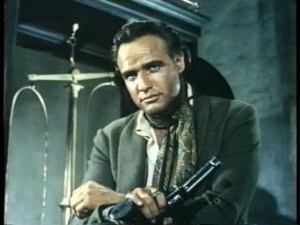 One-Eyed Jacks is the only film directed by Marlon Brando, and curiously enough it is just like one of his performances. Ponderous, clumsy, inarticulate, yet brooding with profound flashes of character. Like any Brando performance, you sit there waiting as he stumbles over lines, stops for thought and mumbles through the parts he is unsure of, but then, just when it seems he has lost himself, he comes through with a delivery of incredible potency, providing shades of a character that no script could ever describe. Moments like that, the “contender” speech, his feral “Stella!” cry or his garden demise in The Godfather, make any lulls or cumbersome moments seem instantly better in retrospect, as if he were using those moments to build up to the truly great ones. That is how One-Eyed Jacks feels, the first half long, drawn out and none to interesting. Brando robs a few banks, is betrayed by his partner, shelters a grudge in prison, beds a few women as a drifter – all standard western happenings, done much slower and with much less payoff. It seems like the movie has already spent its 141 minute run-time after the first hour, but then something special happens.
One-Eyed Jacks is the only film directed by Marlon Brando, and curiously enough it is just like one of his performances. Ponderous, clumsy, inarticulate, yet brooding with profound flashes of character. Like any Brando performance, you sit there waiting as he stumbles over lines, stops for thought and mumbles through the parts he is unsure of, but then, just when it seems he has lost himself, he comes through with a delivery of incredible potency, providing shades of a character that no script could ever describe. Moments like that, the “contender” speech, his feral “Stella!” cry or his garden demise in The Godfather, make any lulls or cumbersome moments seem instantly better in retrospect, as if he were using those moments to build up to the truly great ones. That is how One-Eyed Jacks feels, the first half long, drawn out and none to interesting. Brando robs a few banks, is betrayed by his partner, shelters a grudge in prison, beds a few women as a drifter – all standard western happenings, done much slower and with much less payoff. It seems like the movie has already spent its 141 minute run-time after the first hour, but then something special happens.
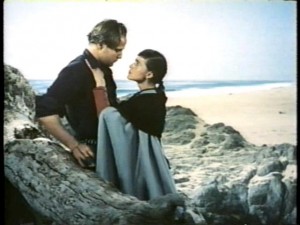 When Brando’s character finally meets up again with Karl Malden’s character for a second time, a sort of magic occurs. Malden and Brando’s characters had a standard repartee before crime and time forced them to become different people, and it is at that point where the movie really begins. We soon learn why we had to endure all the clichés in long and cumbersome fashion…Brando was setting up the standards of the western just so he could tear them down in the second half. Like his finest performances, he first emphasizes his flaws, only to trump them all with a tour de force finish. One-Eyed Jacks is a film that aims to build up the tradition of the Western, only to tear it down in its focus on the flaws of man and the breakdown of masculinity.
When Brando’s character finally meets up again with Karl Malden’s character for a second time, a sort of magic occurs. Malden and Brando’s characters had a standard repartee before crime and time forced them to become different people, and it is at that point where the movie really begins. We soon learn why we had to endure all the clichés in long and cumbersome fashion…Brando was setting up the standards of the western just so he could tear them down in the second half. Like his finest performances, he first emphasizes his flaws, only to trump them all with a tour de force finish. One-Eyed Jacks is a film that aims to build up the tradition of the Western, only to tear it down in its focus on the flaws of man and the breakdown of masculinity.
Brando was championed when he first erupted onto screens in the fifties for projecting a rawness, ridden with flaws, humanizing actors from that point on with a tarnished masculinity. His characters spoke out to a country whose males had been shaped and scarred forever by World War II, proving that it was okay for man to be weak, confused and yet, explosive. It is only natural, that in his first directorial effort, he would put masculinity at the forefront of his western picture, changing it for the western like he did for modern pictures in the fifties. The title itself, One-Eyed Jacks, is itself a good primer to the statement Brando wishes to make about masculinity. We project appearances of gallantry and control, but nobody ever sees the other eye of our emotions. Brando’s character seems to always be in control, but brooding beneath the surface are hostilities and feelings of inadequacy stemming from being abandoned as a child. He needed a father, and “Dad” Longworth (Malden) was all that he had – until Dad turned his back on him.
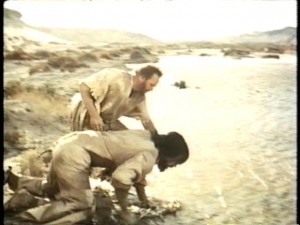 So Brando’s character is one scarred by abandonment, and the only eye he shows is that of a typical John Wayne western hero. But Brando has the ability to reveal the insides of his characters, their feelings, thoughts and desires, both as an actor, and as a director. He projects both sides of a one-eyed jack as an actor, and directs Malden with a similar panache for probing his characters. Malden’s character, too, is a One-Eyed Jack, but in a different manner than Brando. Brando’s was one dealing with appearances masking emotion, whereas Malden’s is one of appearances masking the past. He was an outlaw in his old life, and is now a sheriff, and must constantly disguise his history like a Jack would his other half. So when the two one-eyed jacks finally meet, both of their hidden selves are brutally exposed, since each knows the other’s secrets. Their guards have been let down, as heroic gestures of masculinity fall in favor of revealing personal character.
So Brando’s character is one scarred by abandonment, and the only eye he shows is that of a typical John Wayne western hero. But Brando has the ability to reveal the insides of his characters, their feelings, thoughts and desires, both as an actor, and as a director. He projects both sides of a one-eyed jack as an actor, and directs Malden with a similar panache for probing his characters. Malden’s character, too, is a One-Eyed Jack, but in a different manner than Brando. Brando’s was one dealing with appearances masking emotion, whereas Malden’s is one of appearances masking the past. He was an outlaw in his old life, and is now a sheriff, and must constantly disguise his history like a Jack would his other half. So when the two one-eyed jacks finally meet, both of their hidden selves are brutally exposed, since each knows the other’s secrets. Their guards have been let down, as heroic gestures of masculinity fall in favor of revealing personal character.
So with masculinity destroyed, everyone becomes humanized, flaws and all. This humanization is what Brando uses to take down the conventions of the western. No longer are their heroes and victims, cowboys and Indians, but merely flawed people dealing with their flawed selves. That is what makes the final confrontation so exciting – we don’t know who to root for, and more importantly, we don’t know who will win. Either Brando or Malden could triumph, since both have their strengths, and either could fail, since they both have their faults. By doing away with conventions Brando has revived the suspense in a calculated and clichéd genre, and the last half of One-Eyed Jacks bubbles with originality. Never has an exploration of character been so exciting, and rarely has a western been so bold. It is slow going to get to that point, but Brando has that miraculous ability at surprising you just when you think he has nothing left. In One-Eyed Jacks, Brando has all the right cards hidden up in his sleeve.
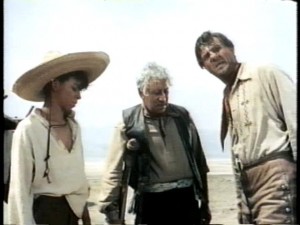 Analysis by an American: Shawn McLoughlin
Analysis by an American: Shawn McLoughlin
Never would I have considered myself a techie, because for the most part I’m not the type to complain if I see a few artifacts on the screen or other flaws in the print. This all changed after viewing Marlon Brando’s One-Eyed Jacks. Dealing with the Madacy DVD presentation was a torturous experience, and goes down as the worst DVD I have ever watched. During the first forty minutes of the film, I hated it. Upon its completion, I enjoyed it, but had to desire to re-watch any of it. The story was fine, Brando’s acting was typical Brando; all ingredients for an enjoyable time. But with the constant hissing coming from the speakers, and the color shifts every 5 minutes I really had a difficult time getting involved. It was hard to overcome these presentation hurdles, but I managed to do so.*
The whole film is, visually, stale toast throughout. Stanley Kubrick was originally supposed to direct this, but you would never get that impression with any of the visuals used in the film. There is absolutely nothing memorable about the direction. Many of the shots are completely static, others are simply uninspired. There is one shot in particular during the “bullet game” where the P.O.V. shifts to Rio’s (Brando’s character) hands behind his back to show that he has a bullet in each hand. This is one of the few shots that are not either an over-the-shoulder shot, or a landscape shot – the impacts of which are no doubt lessened by the horrible pan-and-scan transfer that Madacy released. It doesn’t have the style of the John Ford films before it, or the Leone films that followed. I can’t see anyone arguing that this is anything other than just another formulaic western. It isn’t a particularly bad film, but it doesn’t take me to anyplace I haven’t already been. At its core it is an altogether average revenge film; Brando playing a basic anti-hero. There was an obvious attempt made to get some more character development than you usually might find, but it never gives the viewer enough to actually care about any of them. In the released version of there are several scenes of Rio’s rampant womanizing, and random violence against people who do the same. This was entertaining, because Brando knows how to pull off this type of character. But this entertainment is nearly lost in a sea of vast nothingness that makes up most of the film. Apparently a five-hour cut exists and Paramount forced them to cut it. Indeed, Paramount, you have my thanks, because the movie is 40 minutes too long as it is. Lots of shoot-outs are not needed to make a great western, but this film surely would have been more involving by having a few more – something is needed to get through the drags.
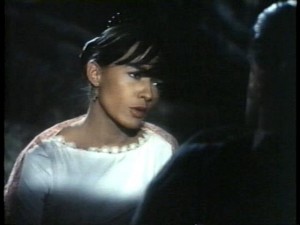 The film has its merits, and is certainly a nice diversion for a lazy afternoon. But does it really deserve all the accolades it receives? Why is it that I found it so passé and yet many critics rave about this as some lost masterpiece? These are the only questions that the film left me with. The only reason I can extrapolate is that, being the sole directorial effort from Marlon Brando, people feel it is more necessary to forgive it for its flaws. In reality, Brando simply learned a lesson the hard way. It is the very same lesson that Stephen King learned upon completion of filming Maximum Overdrive. Neither one of these “directors” belong behind the camera. Thankfully though, One-Eyed Jacks was far from a career killer for anyone involved. Brando and Malden, of course, went on to act in many great films, just as before. But it was Ben Johnson, star of many other westerns that became the most fortunate of the three – he starred in Cherry 2000.
The film has its merits, and is certainly a nice diversion for a lazy afternoon. But does it really deserve all the accolades it receives? Why is it that I found it so passé and yet many critics rave about this as some lost masterpiece? These are the only questions that the film left me with. The only reason I can extrapolate is that, being the sole directorial effort from Marlon Brando, people feel it is more necessary to forgive it for its flaws. In reality, Brando simply learned a lesson the hard way. It is the very same lesson that Stephen King learned upon completion of filming Maximum Overdrive. Neither one of these “directors” belong behind the camera. Thankfully though, One-Eyed Jacks was far from a career killer for anyone involved. Brando and Malden, of course, went on to act in many great films, just as before. But it was Ben Johnson, star of many other westerns that became the most fortunate of the three – he starred in Cherry 2000.
* If this film ever receives a proper release from either Paramount or a Criterion-type studio, I will certainly give the film another chance. There may be, on the off-chance, something I am really missing due to the horrible presentation. Quite frankly, I wouldn’t be surprised either.
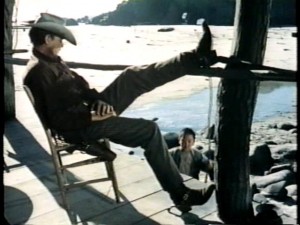 Analysis by an elitist: Adam Lippe
Analysis by an elitist: Adam Lippe
Brooding like a mix of Elvis and James Dean, Marlon Brando’s self-destructive protagonist in One-Eyed Jacks was a bold choice to play for the star, especially for a big budget studio film in the late ’50s. This may have played a part in why Paramount was unsatisfied with the movie. And took it away from Brando, trying to soften him up to more generic and acceptable as a hero. In fact, the entire romance angle, especially in the second half, feels tacked on. Louisa falls for him too quickly, without any development in their relationship, and when he admits he has made up his entire past just to protect her, she is hurt. But she inexplicably forgives him and risks her life several times for him.
The story might have been considerably more complex had Rio used Louisa to get back at Dad. Rio sleeps with her on the first night, and then admits what a scoundrel he has been. The film downplays the reality; he has taken her virginity, impregnated her, ruined her reputation and made her a cynic for life with other men. Considering the time period, Louisa would have been blamed and her life either scarred permanently by having the child, or sent away from her newly-adopted father and forced to get an abortion. Brando’s unintelligible mumbling should have been used as a deeper insight into his character, perhaps his real thoughts as opposed to the numerous false layers he displays, rather than as another James Dean reference (in addition to the image of Bob sitting with his hat over his eyes, his feet on a chair, trying to nap on the deck while they hide out in the fish town, a direct steal from Giant). The fact that he falls for Louisa for real, feels false. He acts no differently than the first woman we see him trying to bed before he goes to prison. The viewer can’t really feel sympathy for him after the way he treats Louisa, and her naiveté, while natural at first, begins to look more like inherent stupidity as the film goes along.
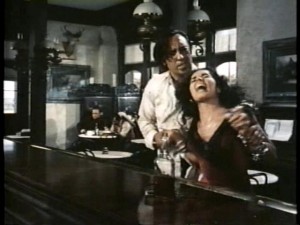 A sharpening of their scenes would have also cut down on the running time considerably. The meandering, sappy nature of their material is not just incongruous with the remainder of the tone of the film, but it kills the snappy pacing established in the conflict between Dad and Rio. It is clear why Rio wants his revenge and even seems reasonable. Attempts to make him appear a sympathetic, honest man are phony. The movie is further hampered by the two “in defense of women” scenes, which are tacked on in quite obviously manipulative ways. While it is necessary for Dad to justify to the town a reason to whip Rio and then break his hand, the cliché of having this lifetime criminal be a softy inside is a mistake and breaks faith with the unique ways that Brando handles the normal genre requirements.
A sharpening of their scenes would have also cut down on the running time considerably. The meandering, sappy nature of their material is not just incongruous with the remainder of the tone of the film, but it kills the snappy pacing established in the conflict between Dad and Rio. It is clear why Rio wants his revenge and even seems reasonable. Attempts to make him appear a sympathetic, honest man are phony. The movie is further hampered by the two “in defense of women” scenes, which are tacked on in quite obviously manipulative ways. While it is necessary for Dad to justify to the town a reason to whip Rio and then break his hand, the cliché of having this lifetime criminal be a softy inside is a mistake and breaks faith with the unique ways that Brando handles the normal genre requirements.
In a standard western, character development would have been forgone in favor of action. So it is refreshing that, as director, Brando chooses to spend so much time establishing Rio’s rehab and the growing impatience of his fellow bandits when it would have been very easy to simply cut to their plans to rob the bank and the group falling out that led up to it. It is even more impressive the way that the initial getaway is shown. Trapped and clueless as to how to escape the deserts, Rio mysteriously gives himself up, allowing Dad to reveal his real interest in life, greed (further emphasized by the way he seems to view his wife and stepchild as gained property which he has successfully invested in and moved to more profitable grounds). Rio’s lack of a master plan at this point is believable. He’s a young, innocent kid who believes himself to be invincible. But that he has no real conception of how to get back at Dad when he gets to the Sherriff’s town is hard to fathom. If he was really stewing in a Mexican prison for five years, not only would he have matured and hardened, he would have concocted many a plan. Even if some were foolish and shortsighted, some would have been worked out thoroughly and been very detailed. The way the film presents it, the plan for revenge simply falls in his lap out of coincidence and contrivance (another scene defending a lady), because Bob happens to recognize him and be interested in robbing a bank. This lack of focus and direction is what prevents One Eyed Jacks from being a truly great western.
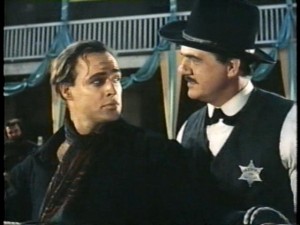 The Chat
The Chat
Adam Who else thought it was unique that the Spanish was untranslated? Well, perhaps unique was the wrong word since it was also done in The Treasure of the Sierra Madre. It was easy to understand what they were saying in One-Eyed Jacks via body language. And a minimal understanding of Spanish.
Rhett Considering how Brando’s performances are always riddled with ambiguities, it seems kind of fitting that he would direct dialogue that way, never letting us see exactly what they say, instead making us pickup gestures, etc… Can we all just agree that Brando saying “Get up, you big tub o’ guts” is the greatest line ever spoken in cinema and move on?
Shawn I remember very little dialogue. It was mostly an unmemorable experience for me.
Rhett The first half was overly drawn out and at times plodding.
Adam I liked the way they robbed the bank at the beginning, and especially the way that Brando is caught. I think the middle sections are the ones that are plodding. The first 35 minutes moved quite quickly for me, because the premise is solid and it is set up in such an interesting fashion. Brando gives himself up on purpose for no logical reason.
Rhett Yeah, the start is good in that regard. What I really liked about the last half, though, when Brando and Malden met up again five years later. How Brando sort of does away with the hero/villain relationship that usually ties up most westerns, they both just become flawed characters, each with a right to hold a grudge and each with their own virtues and vices. That made the shootout especially interesting to me, because I did not know ahead of time who would come out on top.
Adam That’s why I was kind of disappointed in the romance angle. So generic.
Shawn What romance?
Adam Yeah Shawn, not even a developed romance. Wouldn’t it have been better were he just using her to get back at dad? And when he admits he’s a liar, it’s simply to break her heart forever. And not because he’s coming clean.
Rhett I took it that, as director, Brando set up all these tired western clichés for the most of it, and then tore it down with the Malden/Brando scenes.
Shawn I’m tempted to believe that all romance scenes were just candid let’s keep-the-camera-rolling off-screen Brando antics. At least, that would make them more interesting to me.
Rhett That would have certainly made it more interesting, although I did like that he just sort of came clean out of the blue. There wasn’t an overlying plot point that made him do this, it shows a lot of the kind of character he is, which is what I always like about Brando.
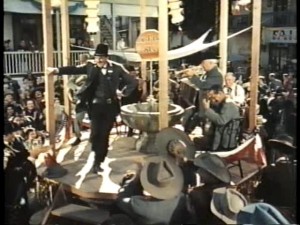 Adam He could use it as a further way to disgrace dad. Deflower his stepdaughter, get her pregnant, and make sure she never trusts men again.
Adam He could use it as a further way to disgrace dad. Deflower his stepdaughter, get her pregnant, and make sure she never trusts men again.
Rhett If Neil Labute does the remake, that’s what will happen.
Shawn Apparently, it was remade, according to the IMDB anyway. The Turkish One-Eyed Jacks.
Rhett It is odd that the whole deflowering part is kept from Malden and the audience for so long. When the girl says all they did was walk on the beach, I wholeheartedly believed her
Adam Oh, I know always to believe Slim Pickens.
Rhett I liked that line in the film that Brando says, “the pickens are slim these days.” That had to be an in-joke.
Adam But what kind of ending does the movie have? He leaves, promising to meet her later. But really, are they supposed to be together anyway?
Rhett That could serve your thesis about getting back at dad quite well.
Shawn It’s typical cowboy grandstanding. Cowboys and sailors are two of a kind.
Rhett But the guy always rides off with the girl. This has a sense of unfulfillment.
Adam Brando did do the Mutiny On the Bounty pose several times, Shawn. One of many visual references to his own career and others.
Rhett I think many bits were meant to clearly be self-referential. There is a lot of shit done to his image, stuff poking at his weight, his womanizing, and his panache for knocking up poor foreigners.
Adam His weight, Rhett? Wasn’t there a weight joke at someone else’s expense? This was pre-fat Brando anyway, unless he was foreshadowing himself.
Rhett I think Brando eats in nearly every scene of the second act. He was getting bigger by then. Someone says to him, “stop eating, you’ll get too fat to run.” In fact, I don’t think the girlfriend’s plan would have worked in the end, since he would have just eaten the stew and unknowingly ingested the gun as well … In his “big tub o’ guts!”
Adam What was it she had in her hand that she gave him? That is, if it wasn’t bullets.
Rhett Yeah that was kind of confusing. I guess she wasn’t able to transfer them.
Adam I assumed it was the keys. Maybe it was what she intended to perform her abortion with but she wanted to give him the first shot… Mini-coat hanger.
Rhett I think the coat hanger is it. If it isn’t, it should be.
Shawn I just checked. It was bullets.
Adam Then why were there no bullets in the gun if she gave them to him?
Rhett Did she for sure hand them off? She seemed to be struggling.
Shawn They fell to the floor when the officer grabbed her.
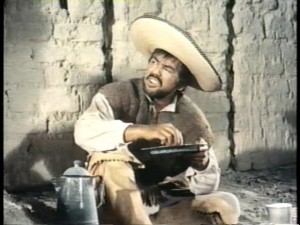 Rhett Yeah, that wasn’t really made quite clear, Shawn.
Rhett Yeah, that wasn’t really made quite clear, Shawn.
Adam There were several scenes that were anti-gun violence, maybe that was one of them. There was also the scene where they want to go in and kill Dad. “That’s not how I do things,” when it obviously would have been the best idea. He could have fired many shots at the Mexicans in the opening scenes, but he chose to give himself up. He stacks the deck against himself by putting two bullets in his hands, intending to be captured/killed.
Shawn I just took those as selfless gestures.
Adam Selfless does not mean you lack self-preservation.
Rhett Even in the scene between the Mexican and Ben Johnson, the Mexican uses the gun as a last alternative, and even then is hesitant.
Shawn It needs to be said, no one beats the hell out of someone like Brando.
Rhett I really liked Brando in this.
Shawn I liked him in this, but not behind the camera.
Rhett There weren’t any scenes that totally stood out, but his aloofness was always just a little bit different than you’d expect.
Adam He was as confused as his direction. One-Eyed Jacks truly is flatly directed in terms of the misc en scene, but not the style. He averted all the genre clichés but there was no visual panache.
Shawn The story is fine enough, but there are plenty of great westerns out there. How did Brando avoid clichés?
Adam The movie avoids clichés in the way that the protagonist is not a hero, nor is anyone else. The closest anyone comes to noble is the Mexican who follows Rio around.
Rhett By doing that the climax actually has some intensity, since you don’t know the outcome beforehand
Adam Including to his own death.
Rhett it is something that I think Michael Mann took a little from with Heat.
Adam Yes, I thought of Heat expressly, specifically when he arrives to tell him he’s just come to town and they lie to each other. And there’s that mammoth crotch shot where the camera goes right towards Brando’s manhood as he’s entering frame.
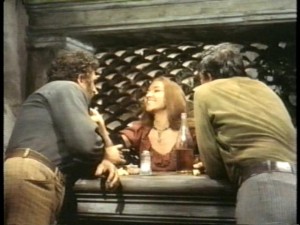 Rhett They seem to really like each other deep down, but decide they must hunt each other, just because that is what they need to do. Had there been a scene with Natalie Wood slitting her wrists in the bathtub I would have called Mann a plagiarist.
Rhett They seem to really like each other deep down, but decide they must hunt each other, just because that is what they need to do. Had there been a scene with Natalie Wood slitting her wrists in the bathtub I would have called Mann a plagiarist.
Shawn I can see that, I guess I had a hard time placing it in its time period. Instead I was just comparing it to other westerns.
Adam A lot of films released now are westerns, they just aren’t thought of that way. Assault on Precinct 13, the Star Wars films, etc. A huge number of action films.
Shawn I think most in the know realize that AOP13 is a remake of Rio Bravo anyway. Just because the sand is gone, doesn’t make it any less a western.
Adam You think that people who saw the recent AOP13 remake knew it was a remake of Rio Bravo? Most people didn’t even know it was a remake at all. Ghosts of Mars is the same damn movie, but people who are Carpenter fans deny that is remake.
Rhett Ghosts of Mars is another modern western; probably the closest Carpenter ever came.
Adam Vampires is also a western. If you delete the endless subplot with Cheryl Lee being holed up with Lapaglia/Daniel Baldwin it’s almost unmistakable from one.
Rhett As is Escape From L.A.
Shawn As is Escape From New York.
Rhett I bet somewhere there is a defense that Halloween is a western.
Shawn Christine… obviously. The Chevy is a metal horse. A possessed horse, sure. But a horse nevertheless.
Adam I think you have a golden screenplay idea, Shawn. Remake every single modern film, but with horses.
Shawn I could just remake Circle of Friends with an all horse cast.
Rhett Replacing everyone but Andie MacDowell of course… So anyway, I think this all ties back to the fact that One-Eyed Jacks was a valiant attempt at deconstructing the western and making it exciting again.
Adam But Rhett, are these avoidances of genre clichés enough to counterbalance a lot of the audience concessions throughout the film? I don’t mind that a film can be long, but the focus on Louisa was a mistake and drew out the film about 30 more minutes than needed.
Shawn I think Louisa was there to serve as just another person for Rio to lie to.
Rhett I didn’t think the Louisa parts were overlong, since they mostly advanced the story. I thought the stuff with Ben Johnson was most cumbersome, a side plot that didn’t really need to be. At least the Louisa stuff ties into the ambiguous finale.
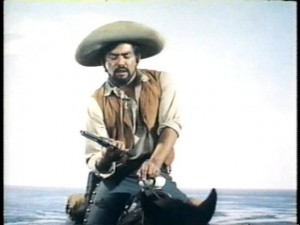 Adam But a lot of her scenes go on and on. They needed sharpness, often brevity.
Adam But a lot of her scenes go on and on. They needed sharpness, often brevity.
Rhett And even then, we are left confused as the audience on who we are supposed to be watching the film as. We follow Brando the entire way, but then the final shot suggests we take the perspective of the woman instead. I was waiting for the shot of Brando riding off into the sunset, but there never was one, just her looking.
Shawn Louisa is necessary for the finale, but she was a useless character otherwise.
Adam The one advantage of the poor shape of the prints sourced for the DVDs we watched was the washed out look of the sand and deserts, everything appearing an ugly off-white. It took away any romantic notion.
Shawn I was going to mention that, Adam. The last scene specifically was quite attractive. It was so bleached on my DVD that the horse she was on actually blurred with the sand.
Rhett But at the same time the last scene seemed very cold, which made the finale even more ambiguous. Like maybe Brando was just a playa the whole time.
Shawn I wonder if there will ever be a real DVD release*. I’m sure Criterion would do it.
Rhett I’m surprised they haven’t. They could milk it as Brando’s only director’s credit.
Adam There’s not enough of a following, I’d imagine.
Rhett They’ve picked up public domain titles before, so that shouldnt be what is holding them back from this
Adam One-Eyed Jacks is a mid-style movie, not quite satisfying to either kind of audience. It takes chances to avoid western clichés, but not quite bold enough in all ways. And not generic enough to satisfy someone who wants a typical western.
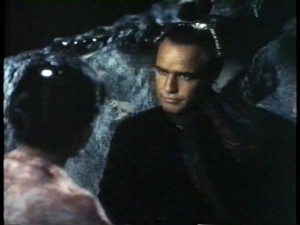 Rhett Yes, the movie definitely could have gone further. But IMDB claims that Brando’s original vision was cut down by editors from its initial 5 hour length. So his original cut could very well have been the genre breaker he set out to make.
Rhett Yes, the movie definitely could have gone further. But IMDB claims that Brando’s original vision was cut down by editors from its initial 5 hour length. So his original cut could very well have been the genre breaker he set out to make.
Shawn One-Eyed Jacks has none style of the Leone or Ford films.
Adam I’m sure some pretentious writer could characterize it as anti-style.
Rhett Even I wouldn’t go that far
Adam C’mon Rhett, you know you want to be pretentious enough.
Rhett Brando is an actor who understands character and emotion and that is what he does with this, using his knowledge of character to do away with stereotypical caricatures in favor of grayed and flawed humanization.
Shawn This film needed more zombies. That is my pretentious comment. “Grayed and flawed humans” i.e. Zombies.
Rhett I liked how Brando’s character wasn’t afraid of winning through cowardly methods, such as by faking that he was shot and then shooting Malden in the back. Very atypical for a shootout to end with such cowardice.
Shawn “The character of Louisa, played by Pina Pellicer, was shot in the back and killed by a stray bullet fired at Rio by the dying Sheriff Dad Longworth in Brando’s original cut of the film. Paramount substituted a different, upbeat ending that appears in the film.”
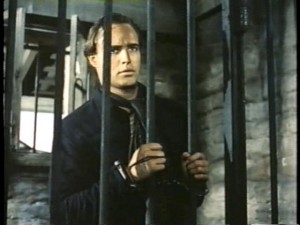 Rhett That is very interesting since it would mirror the accidental death of the girl in the bank as well. Perhaps Brando was hinting at a theme that women are victim to man’s games of gallantry and masculinity, either impregnating them with sex or killing them with pissing contest violence.
Rhett That is very interesting since it would mirror the accidental death of the girl in the bank as well. Perhaps Brando was hinting at a theme that women are victim to man’s games of gallantry and masculinity, either impregnating them with sex or killing them with pissing contest violence.
Shawn Do you think that ending would have been an improvement though?
Rhett I’m not sure. I like the ambiguities it has as is. But that certainly wouldn’t have made it less interesting had she been killed.
Adam Yes, it would have, Rhett. Because if she’s killed, there’s finality and no ambiguity.
Shawn But if she died, then that would mean that he could ride off into the sunset. There is nothing to potentially ground him there.
Rhett But perhaps her being killed would have amounted to a more ambiguous outcome between Malden and Brando.
Shawn But Malden would be dead as well.
Rhett But would he ride off into the sunset? He would have nothing to live for with her dead.
Adam Would it have been better had everyone died and we get a Au Hasard Balthazar-like dead-guy-riding-on-horse ending?
Shawn No, that’s always a cop out. Although if a dead Malden rode off on a horse, that would ambiguously tell me that he became a ZOMBIE!
Adam I think you could animate that nose without any zombieness needed.
Rhett Malden should have played Paul Rudd pre-nose job in The Shape of Things.
Adam Then we should bring back Brando as a zombie.
Rhett Puppetted by Frank Oz.
Shawn Do you think that Brando has decomposed enough by now to fit in his old One-Eyed Jacks costume?
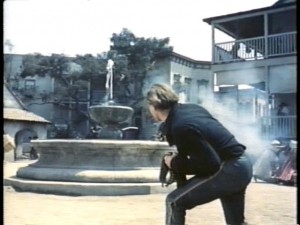 Rhett If grossly overweight people are cremated, do they need a larger urn? Or would they just leave part of the ashes and cram the rest in a regular sized one?
Rhett If grossly overweight people are cremated, do they need a larger urn? Or would they just leave part of the ashes and cram the rest in a regular sized one?
* At the moment, One-Eyed Jacks is in the public domain, which has resulted in a ton of poorly mastered DVD releases. The audio on the version Adam saw was reversed, as in the audio on the left was coming out of the right channel and vice versa. Rhett and Shawn experienced similar problems. There’s a rumor of Criterion putting out their own edition, but at the moment, anyone who deigns to watch the movie will suffer like we did. If you enjoyed the movie and/or our analysis, please email Criterion to request it.




Glenn Howard says:
April 29th, 2014
2:30 pm
You guys must have some innate jealousy of Brando. Shane and One Eyed Jacks are two of the best westerns ever made. Even cutting it from 5 hours to 243 minutes left out nothing that was truly intricate and profound.
Adam Lippe says:
April 30th, 2014
1:12 am
You’re absolutely correct. We’re totally jealous of Brando. Especially his role in Shane.
albin says:
February 25th, 2017
7:04 pm
I thought the movie dragged in places but had some really brilliant moments. The beginning up until after he escaped from jail was great… wish he would have detailed the jail time a bit more and his relationship with the Mexican friend. Then the movie slowed too much and I wasn’t impressed with Malden’s daughter’s acting. Needed more action in the middle but the whipping and hand breaking scenes was very good. Really liked the Brando Malden shoot out and the reality of the “dirty” fight shooting him in the back.
The acting from Brandon and Malden was superb – top of their games and equally good. I loved seeing Slim Pickens in an “evil” role and Ben Johnson was fantastic as well.
I wish I could have all the footage and cut it the way I would like the story to go.